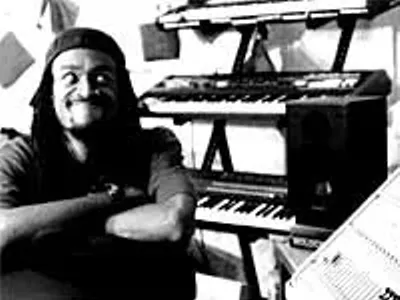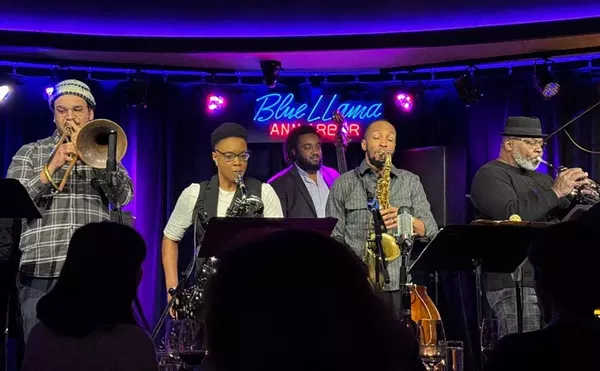Henry “Madness” Mayers had a story to tell — a story he’s lived and relived vicariously through others during his tumultuous 17-year career as a music promoter and video director. But he couldn’t figure out how best to tell it. Recording an album would have been too typical, and writing a book didn’t appeal to him. So Mayers took the rockiest road and turned his story into a script, dug up anybody that owed him coin and made a flick starring many Detroiters.
“I just wanted to tell a story about four guys who wanted to make it in the music business,” Mayers says. “But I wanted it to have the same energy the ’70s did — that whole period of time when people were just doing music for music’s sake.”
Music for music’s sake? A ’70s feel? And the hook is? These were questions that taunted Mayers as he raised $300,000 to bring his story to life.
The frustration still plays on his face as he recalls the process. “Raising the first 50 grand was like passing a kidney stone,” he says. “Money is tight these days, so investors wanted to know, ‘Who’s going to buy this?’”
Good question, because The Brewster Project ain’t a movie for soccer moms. If anything, it works as a kind of music biz cautionary tale and caters to anyone who’s ever aspired to be a recording artist. It’s a well-told idea, to be sure, but one made relevant on the streets of Detroit.
“My target audience is young people in the music and the entertainment business who don’t have a voice,” Mayers explains.
Knowing he could not afford to make a movie with a ’70s setting, Mayers looked to hip hop (the film chugs ably along with a thumping sound track) and an old housing project as a platform upon which to build his narrative.
“I was driving down I-75 where the Brewster Projects used to be,” he continues. “I thought, wouldn’t it be cool if a videotape was found underneath all that rubble telling this story. And since hip hop is where Detroit is going musically, it all made sense.”
Born in Cairo, Egypt, which his family left when he was a year old, Mayers is an independent thinker with a hustler’s mentality. Now in his early 40s, he’s either quit or has been fired from several local television stations for what he calls “speaking up for what’s right. I’ve just always wanted to do my own thing, and music is just a natural extension of who I am.”
With long, braided blond hair and a penchant for old-school slang, you could picture him with a speaking part in School of Rock, or pounding the drum kit behind George Clinton. Mayers is a throwback of sorts: a throwback to everything that was fun about music, that was fun about film.
“I worked for many years in the music business for different labels, so there were a lot of things I saw that led me to want to put this kind of movie out,” he says.
And what he’s dropped is a simple yet insightful tale about how music sours when currency becomes more essential than art.
Shot in 12 days, photo-documentary style, the film sees Malik (Mr. Cheeks from the Lost Boyz), his brother Orpheus (singer Mike Shorey) and best friends Jayson and Marcus (Paradime and Trick-Trick) as aspiring rappers christened the Brewster Boys (who, of course, have a knack for running into the usual dead-ends that litter the music biz). Unbeknownst to the others, Malik decides to finance his family, and the group, by dealing drugs. What makes it work is the time spent exploring each character’s personality, their interactions.
The Brewster Project has ample hip-hop and R&B notables (Malik’s mother Nana is played by R&B queen Regina Belle).
While the film rolls along tediously at first, it slowly picks up steam and climaxes when Orpheus discovers Malik’s pharmaceutical trade and Malik tries to undercut his supplier, Panther (Detroiter and NBA player Robert Traylor).
“I can personally relate to Malik,” explains Mayers. “We are in a society where you are not given a chance a lot of times based on [your] race, or religion, etc. A lot of people do things to feed their families, but they are not bad guys. Malik is one of those people.
“I wanted everything to feel as genuine as possible. Detroit has some enduring qualities, so I choose to show them by characterizing real life. I’ve seen the Master P films. I wanted to go beyond that hip-hop exploitation stuff. I’ve had friends who’ve gotten killed over some bad shit, so I felt there was no need to glamorize it. I wanted to show the effect that tragedy has on the whole family and community.”
Also noteworthy are the Detroit locations, a veritable photo album: Club 2000, CoCo’s House of Comedy, Intermezzo and Captain’s Bar and Grill all make appearances.
“We have a city we should be proud of. It’s more to Detroit than the 8 Mile image,” he says.
And that image of Detroit may be seen by many; The Brewster Project was a smash at the New York International Independent Film and Video Festival in March, winning the Audience Award for Best Feature; Belle won for Best Actress, and one-time Destiny’s Child Farrah Franklin won Best Supporting Actress (for her role as Malik’s girlfriend Maya).
The Brewster Project isn’t your typical straight-to-video hood movie. Not in the least. The short-term success leads Mayers, a jovial guy, to smile even more broadly.
“I think people have been very proud of what I’ve done,” he says. “I’m not showing Detroit in a bad light, and didn’t go overboard with the other stuff, I just kept it like real life.”
The Brewster Project hits video stores June 22; a July 10 screening is scheduled at the State Theatre (2115 Woodward Ave., Detroit). Call 313-961-5450 for more info.
Kahn Davison writes about urban music for Metro Times. E-mail [email protected]






